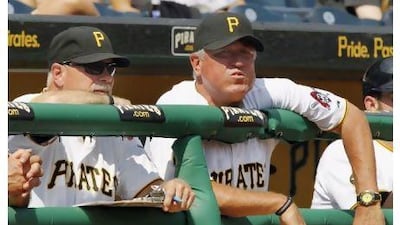As the botched plays and bad losses and loud boos from the fans mounted in recent days, Clint Hurdle and his Pittsburgh Pirates stood firm in reciting a familiar refrain.
Over the course of a 162-game Major League Baseball season, they rationalised, every club endures a slump, a stretch of poor play, a losing streak.
"We know there's no reason to panic," the outfielder Garrett Jones said, "because even the best teams have rough patches like this."
But never in major league history has a team suffered a losing streak this costly, this quickly.
Leading the National League Central on July 25, the Pirates lost the next day when Jerry Meals, the plate umpire, admittedly made the wrong call in the 19th inning against Atlanta. By Sunday night, Pittsburgh had lost 10 in a row and suddenly found themselves trailing by 10 games.
Never before had a first-place team plunged 10 games back in a 13-day span, baseball researchers said.
Coming off the worst run of results at home in their 125-year existence, the Pirates ended their skid on Monday night with a 5-0 win over the San Francisco Giants, the World Series champions.
"To go from in the hunt to out of the hunt in 10 games like this, it's bad," the infielder Brandon Wood said after Sunday's 7-3 loss to San Diego, finishing an 0-7 week at home.
"It's amazing how quick things can change. But on the other hand, they can change that quick in the other direction as well," he said.
Look at the Red Sox, the Pirates say, who started 0-6 and now have the best record in the American League.
Or the Brewers, who have gone on separate 0-7 and 1-7 runs but still lead the NL Central.
They had better start heading the other direction soon if the Pirates are to salvage a season that so surprisingly was filled with such promise before the bottom fell out.
A year after losing 105 games for their North American major professional sports record 18th consecutive losing season, these Pirates peaked at 51-44 and were five games over .500 in July for the first time since 1992 when the trouble began with that 4-3 loss to the Braves.
Pittsburgh's players had woke up that morning knowing they were on a team tied for first place and poised to be buyers at the trading deadline for the first time in 14 years. They had also captivated a long-dormant fan base back home.
Less than two weeks later, having acquired Derrek Lee and Ryan Ludwick to help for a possible play-off push, the Pirates were 54-59 and seemingly spiralling toward yet another sub .500 campaign. They had been outscored 82-37 during the 10-game skid and dropped 12 of 13 since peaking.
An embarrassing sweep at the hands of the last-place Padres - the lowest-scoring team in the NL, they hit a team-record 35 runs in a three-game series - followed sweeps at Philadelphia and at home against the Chicago Cubs.
The sell-out crowds that had been drawn in by the strong play of the Pirates in June and the first three weeks of July were booing during losses of 15-5 and 13-2 on Friday and Saturday.
Hurdle, in his first year of managing the Pirates, understood the fans' reaction.
"If you've ever been involved in sports at any level, you've been involved in a situation where you don't win," Hurdle said.
"At the major league level, this is the life we've all chosen, so you understand what comes with it, whether it be public scrutiny, whether it be fan displeasure. When you do well, people cheer. When you don't do well, people can boo."
The 1981 Minnesota Twins and the 1884 Detroit Wolverines are the only two other teams in big league history to drop from first place to 10 games back in the standings in a two-week span, each doing it in 14 days.
But they were 0-0 at the time, so their designation of being the first-place team when the collapse began might come with an asterisk.
The players emerged from a players-only meeting following Saturday's game talking about how they pledged to stick together.
"We have a group of guys here that's pretty special, and we all kind of have each other's backs," the second baseman Neil Walker said. "But it doesn't make it any easier to go through, there's no doubt about that."
Follow
The National Sport
on

